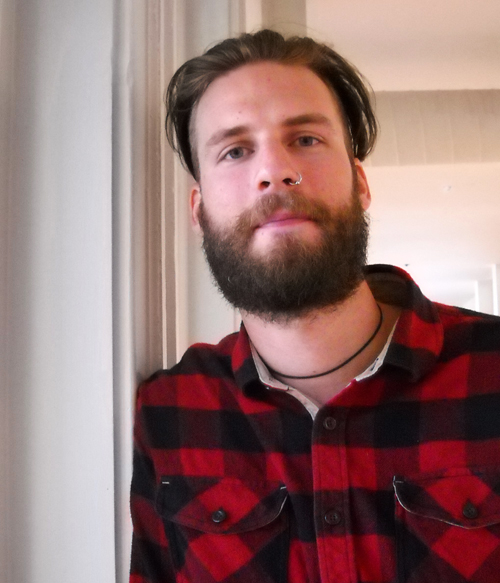
For Dana Deming-Watson, it was the Berlin Biennale. Visiting the contemporary art show in Germany’s capital this past spring was the highlight of an exchange trip to Bremen for the University of Guelph fine art student. Referring to “tons of galleries” of art on view, she says, “I didn’t think I would ever experience that.”
Along with four other studio art students from U of G, she spent two months studying in Europe this past spring. They travelled under an exchange program begun in 2013 with the University of the Arts Bremen (HFK Bremen) and the University of Bremen.
Studying abroad widens undergrads’ view of art and the art world, says Prof. Monica Tap, School of Fine Art and Music (SOFAM). She teaches the specialized studio course for fourth-year students eligible for the Bremen exchange.
“I’m a really strong believer in international exposure,” says Tap. Years ago, she visited Bangladesh before attending the Nova Scotia College of Art and Design, and also spent nine months fashioning pottery in Burkina Faso as a 23-year-old.
“I think a semester of travel can be worth two years of school.” Students abroad become sponges that can take on more and more, she says. “What you absorb can then feed you for years — it’s a gift that keeps on giving.”
The Bremen program was begun by Don Bruce, dean of the College of Arts. Five studio art students took part this year. In 2013, five SOFAM students visited HFK; another seven U of G students and one from the University of Guelph-Humber spent the semester at the University of Bremen that year.
Besides helping students look outward in new ways, the program gives students a fresh look at themselves and their own practice.
Deming-Watson learned about ceramics and bronze casting and got a chance to try a new sculpting medium. Making porcelain involves a special “burnout” technique, she says. “You’re left with a fragile-looking but incredibly strong porcelain piece.”
The trip abroad also gave her something else. Having graduated this year, she’s now looking into art residencies. She says applying for the Bremen trip was a good primer for marketing herself and her skills. “It was a great opportunity.”
This year, five students were chosen from 17 applicants in the studio course, based on their proposals, art samples and stated goals. For next semester’s Bremen excursion, all fourth-year fine art students — about 75 in all — will be permitted to apply.
“They have to be self-motivated and self-reliant. It’s almost like being popped into a graduate program,” says Tap.
For many Guelph students, the exchange was their first taste of Europe. Besides seeing the Berlin Biennale, they visited art venues in Hamburg.
“Students get to see a lot of art they don’t see in Canada and get to see it in person,” says Tap.
Plenty of copies of European artworks are available online, but viewing works on the screen hardly compares to seeing the real thing on the wall. “You have to be in the same room to understand on an intellectual level what art can do.”
This semester, four University of Bremen students are at Guelph; in October, four HFK students visited U of G for the first time.
Although the Guelph students from last spring’s European trip have since graduated, a number are still involved with Guelph’s G Gallery in Toronto and plan to show the German visitors around that city’s art scene.
Samuel de Lange had visited Germany and the Netherlands before. But HFK was new, and so was exposure to filmmaking during last spring’s trip. He ended up working in film with a mentor and has continued exploring the medium since graduating this year.
In June, he won the national BMO student art competition. His work, “PVTREFACTIO VI (Black Sun),” was displayed in October at the Museum of Contemporary Art in Toronto.
Referring to the trip, he says, “Six weeks of being able to make art full-time and just think about art has been beneficial in helping me mature, figure out what I’m interested in.”
He’s now working with SOFAM professor Susan Dobson, editing digital images for an exhibition.
Back in Guelph, students showed their works from Bremen in Zavitz Hall this spring.
Tap says aspects of the trip may percolate inside students for months or even years before surfacing somehow in their work or approach. Challenging preconceptions, experiencing art and culture abroad, getting a new world view: they’re all long-term processes.
“Openness is important for all of us but for artists in particular.”
This fall, Bruce and other members of the College of Arts played host to Bremen administrators to discuss a strategic partnership and grant application.
The connections are now spreading beyond the arts as well. Among the Bremen delegates was Thomas Hoffmeister, dean of the faculty of biology and chemistry at the University of Bremen.
He talked to Mike Emes, dean of the College of Biological Science, and other CBS administrators, faculty members and students about teaching and research interests.
They plan to launch student exchanges and look at potential research collaborations with faculty members at Bremen working in such fields as marine biology, ecology, biodiversity and health. The first group of Guelph science students will spend a semester in Bremen in fall 2015.